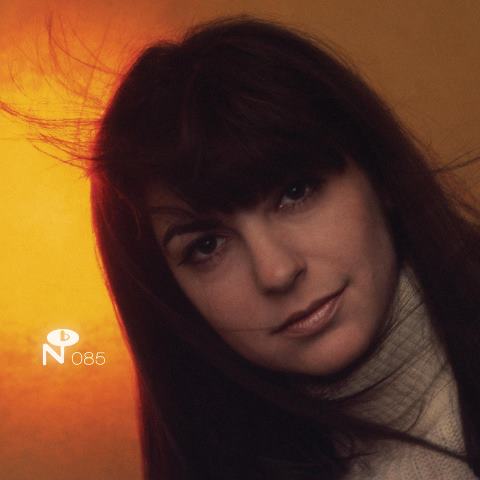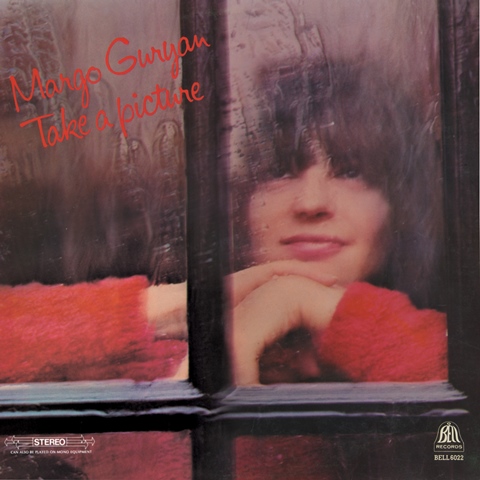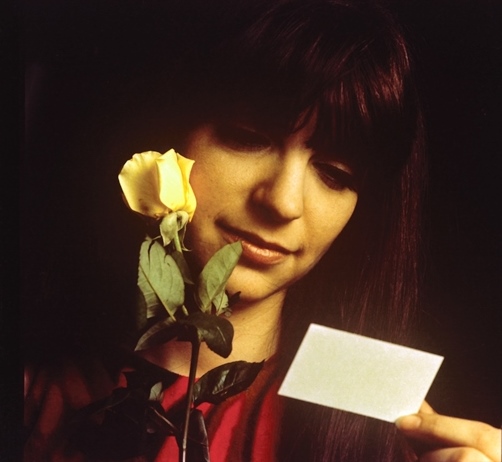Music Reissues Weekly: Margo Guryan - Words and Music | reviews, news & interviews
Music Reissues Weekly: Margo Guryan - Words and Music
Music Reissues Weekly: Margo Guryan - Words and Music
Lavish box set dedicated to the jazz composer who changed tack to embrace Sixties pop

Late summer 1966. Jazz was Margo Guryan’s thing. She was not interested in pop music. This changed when she was played The Beach Boys’s “God Only Knows.” Amazed by what she heard, she tuned in to pop radio for the first time. Her head was further turned by The Beatles and The Mamas & the Papas. A copy of “God Only Knows’s” parent album Pet Sounds was bought.
Newly thrilled by a pop she saw as more innovative than a jazz scene she thought too full of Ornette Coleman imitators, she wrote a song titled “Think of Rain.” In tune with the burgeoning harmony pop style, its baroque leanings and wistful atmosphere bore no traces of free jazz.
 Guryan (1937-2021) already had music business connections, which resulted in interest in her new, pop-inspired songs from April-Blackwood, a music publishing subsidiary of Columbia Records. Demo recordings were made and circulated. “Sunday Mornin” was picked by lush harmony poppers Spanky & Our Gang, and became a US hit in Spring 1968. Before this, her recent songs “I Don't Intend to Spend Christmas Without You” and “Think of Rain” were recorded by Claudine Longet. (pictured right, the Words and Music box set)
Guryan (1937-2021) already had music business connections, which resulted in interest in her new, pop-inspired songs from April-Blackwood, a music publishing subsidiary of Columbia Records. Demo recordings were made and circulated. “Sunday Mornin” was picked by lush harmony poppers Spanky & Our Gang, and became a US hit in Spring 1968. Before this, her recent songs “I Don't Intend to Spend Christmas Without You” and “Think of Rain” were recorded by Claudine Longet. (pictured right, the Words and Music box set)
Although she saw herself as a songwriter, a figure with no public profile, a Margo Guryan album duly appeared. October 1968’s Take a Picture opened with her own version of “Sunday Mornin’.” “Think of Rain” was on there too. The 11-track LP was fabulous, a jazz-underpinned – viz: the drums and Guryan’s own Fender electric piano lines – baroque-soft rock crossover of rare class. There was spaciness, otherness and dashes of weirdness: album closer “Love” isn’t far from roughly contemporary experimentalists The United States Of America, positing itself as a precursor of Broadcast.
Issued by the Bell label, Guryan’s sole album was not promoted as she wouldn’t play live. An instant poor seller, it was rediscovered in the 1990s. The first reissue of Take a Picture arrived in 1996. Two years on, Saint Etienne recorded a version of “I Don't Intend to Spend Christmas Without You.” Then, in 2001, a collection of previously unheard Margo Guryan demos was issued (various configurations of this set, originally titled 25 Demos, have appeared). Now, original pressings of Paint a Picture are regularly priced at £1000 or more.
When Take a Picture was rediscovered, the wider picture and background weren’t known. For a while, the album appeared to be a non sequitur. But as the reissues and archive releases trickled out, it became clear that Margo Guryan’s path was distinctive. Unparalleled.
 Over ten years before Take a Picture’s release, Guryan had begun making her way in music. Born in Queens, New York, she entered Boston university in 1955. Initially, she studied classical piano. She then moved to composition. Her next shift was into jazz. After visiting the Storyville jazz club and playing the interval at a Miles Davis show, she almost ended up on the venue’s own label. There was also a brush with Atlantic Records, who didn’t pick her up as it was thought her voice wasn’t strong enough. Nonetheless “Moon Ride,” one of the songs she played for the label, was recorded by Chris Connor and became an Atlantic single in 1958. After this, in 1959, she got a scholarship to the Lenox School of Jazz where received piano lessons from the soon-to-be Charles Mingus associate Jaki Byard. She became friends with Max Roach.
Over ten years before Take a Picture’s release, Guryan had begun making her way in music. Born in Queens, New York, she entered Boston university in 1955. Initially, she studied classical piano. She then moved to composition. Her next shift was into jazz. After visiting the Storyville jazz club and playing the interval at a Miles Davis show, she almost ended up on the venue’s own label. There was also a brush with Atlantic Records, who didn’t pick her up as it was thought her voice wasn’t strong enough. Nonetheless “Moon Ride,” one of the songs she played for the label, was recorded by Chris Connor and became an Atlantic single in 1958. After this, in 1959, she got a scholarship to the Lenox School of Jazz where received piano lessons from the soon-to-be Charles Mingus associate Jaki Byard. She became friends with Max Roach.
After leaving university, jazz mover Creed Taylor took her on as his secretary. She continued composing, and got a contract with the Modern Jazz Quartet-associated publisher MJQ Music. Leon Bibb, Harry Belafonte, Chris Connor (again), Dizzy Gillespie, Nancy Harrow and Gary McFarland were amongst those who recorded her material. Marrying trombonist Bob Brookmeyer in 1964 put the brakes on the forward motion. The marriage lasted two years. After which – The Beach Boys revelation.
In the wake of the Take a Picture’s release she would not tour as she had seen what this did to the jazz musicians she knew: the loss of control, the time lost which could otherwise be dedicated to composing. The album was accompanied by three singles – one titled “Spanky & Our Gang” – and a swift retreat from her particular take on the music business front lines. With her second husband, music publisher David Rosner, she moved to Los Angeles where she did odd bits of production, but mostly set her own music aside: there were recordings with Neil Diamond’s band (Rosner worked with Diamond).
 Words and Music is a new box set with a slipcase, inside of which are three albums and an LP-sized floppy-cover book. Some original copies of Take a Picture had Words and Music as the title on their label, hence the title here. This is the most full Margo Guryan collection so far, and the most lavishly presented. It looks wonderful. The first side of the album one is a session recorded on 1 April 1957. She sings, plays piano and leads a quartet. At this remove, her voice doesn’t sound weak or wobbly, and the songs are assured. With some music biz faith behind her, she could have slotted in to the jazz scene as it was on record. The next three sides are studio recordings from 1966 to 1968, followed by two final sides of material from 1968 to 1975 – with one outlier, a 2001 recording of “Goodbye July,” a song written in 1966.
Words and Music is a new box set with a slipcase, inside of which are three albums and an LP-sized floppy-cover book. Some original copies of Take a Picture had Words and Music as the title on their label, hence the title here. This is the most full Margo Guryan collection so far, and the most lavishly presented. It looks wonderful. The first side of the album one is a session recorded on 1 April 1957. She sings, plays piano and leads a quartet. At this remove, her voice doesn’t sound weak or wobbly, and the songs are assured. With some music biz faith behind her, she could have slotted in to the jazz scene as it was on record. The next three sides are studio recordings from 1966 to 1968, followed by two final sides of material from 1968 to 1975 – with one outlier, a 2001 recording of “Goodbye July,” a song written in 1966.
Much of what is heard is amazing. A track-by-track breakdown or examination of individual cuts is unnecessary. However, this package is difficult to get to grips with. The booklet crisply goes though the story, but a section with information on the tracks is lacking. Oddly, neither the sticker on the cover or the text mention that the whole of Take a Picture is here. One of the few details given notes that the album tracks (collected on album two, not sequenced in the order of the original album) are taken from a safety copy of the master tape. The booklet identifies the 1 April 1957 tracks heard on side one. Otherwise, all that is given are the years of recording. Presumably, the latter is all that is known? If this is the case, making it explicit would be helpful. The booklet has enough white space to accommodate less threadbare annotation. Equally, a written section on the audio sources would have been interesting: acetates and tapes are illustrated – let’s learn about them.
Words and Music collects 46 tracks. The sticker on the front says that 16 are unreleased, eight of which are the 1 April 1957 session heard on side one. That leaves eight more. As well as Paint a Picture, there are cuts first heard on the various iterations of 25 Demos. But nothing identifies what is previously unissued. This is not user friendly. Potential buyers should be told what they are being asked to fork out for, especially as they may already have some or much of what’s on offer. The oversights perplex. However, despite its mystifying aspects, Words and Music is absolutely essential. Not only does it restate Margo Guryan’s fabulousness, it is stuffed with the most magical music.
- Next week: the latest communiqué from Joe Meek’s Tea Chest Tapes – three CDs of Do The Strum! Joe Meek's Girl Groups & Pop Chanteuses 1960-1966, and Please Stay, two discs of The Cryin’ Shames
- More reissue reviews on theartsdesk
- Kieron Tyler’s website
Share this article
The future of Arts Journalism
You can stop theartsdesk.com closing!
We urgently need financing to survive. Our fundraising drive has thus far raised £49,000 but we need to reach £100,000 or we will be forced to close. Please contribute here: https://gofund.me/c3f6033d
And if you can forward this information to anyone who might assist, we’d be grateful.

Subscribe to theartsdesk.com
Thank you for continuing to read our work on theartsdesk.com. For unlimited access to every article in its entirety, including our archive of more than 15,000 pieces, we're asking for £5 per month or £40 per year. We feel it's a very good deal, and hope you do too.
To take a subscription now simply click here.
And if you're looking for that extra gift for a friend or family member, why not treat them to a theartsdesk.com gift subscription?
more New music
 'Everybody Scream': Florence + The Machine's brooding sixth album
Hauntingly beautiful, this is a sombre slow burn, shifting steadily through gradients
'Everybody Scream': Florence + The Machine's brooding sixth album
Hauntingly beautiful, this is a sombre slow burn, shifting steadily through gradients
 Cat Burns finds 'How to Be Human' but maybe not her own sound
A charming and distinctive voice stifled by generic production
Cat Burns finds 'How to Be Human' but maybe not her own sound
A charming and distinctive voice stifled by generic production
 Todd Rundgren, London Palladium review - bold, soul-inclined makeover charms and enthrals
The wizard confirms why he is a true star
Todd Rundgren, London Palladium review - bold, soul-inclined makeover charms and enthrals
The wizard confirms why he is a true star
 It’s back to the beginning for the latest Dylan Bootleg
Eight CDs encompass Dylan’s earliest recordings up to his first major-league concert
It’s back to the beginning for the latest Dylan Bootleg
Eight CDs encompass Dylan’s earliest recordings up to his first major-league concert
 Ireland's Hilary Woods casts a hypnotic spell with 'Night CRIÚ'
The former bassist of the grunge-leaning trio JJ72 embraces the spectral
Ireland's Hilary Woods casts a hypnotic spell with 'Night CRIÚ'
The former bassist of the grunge-leaning trio JJ72 embraces the spectral
 Lily Allen's 'West End Girl' offers a bloody, broken view into the wreckage of her marriage
Singer's return after seven years away from music is autofiction in the brutally raw
Lily Allen's 'West End Girl' offers a bloody, broken view into the wreckage of her marriage
Singer's return after seven years away from music is autofiction in the brutally raw
 Music Reissues Weekly: Joe Meek - A Curious Mind
How the maverick Sixties producer’s preoccupations influenced his creations
Music Reissues Weekly: Joe Meek - A Curious Mind
How the maverick Sixties producer’s preoccupations influenced his creations
 Pop Will Eat Itself, O2 Institute, Birmingham review - Poppies are back on patrol
PWEI hit home turf and blow the place up
Pop Will Eat Itself, O2 Institute, Birmingham review - Poppies are back on patrol
PWEI hit home turf and blow the place up
 'Fevereaten' sees gothic punk-metallers Witch Fever revel in atmospheric paganist raging
Second album from heavy-riffing quartet expands sonically on their debut
'Fevereaten' sees gothic punk-metallers Witch Fever revel in atmospheric paganist raging
Second album from heavy-riffing quartet expands sonically on their debut
 theartsdesk Q&A: Soft Cell
Upon the untimely passing of Dave Ball we revisit our September 2018 Soft Cell interview
theartsdesk Q&A: Soft Cell
Upon the untimely passing of Dave Ball we revisit our September 2018 Soft Cell interview
 Demi Lovato's ninth album, 'It's Not That Deep', goes for a frolic on the dancefloor
US pop icon's latest is full of unpretentious pop-club bangers
Demi Lovato's ninth album, 'It's Not That Deep', goes for a frolic on the dancefloor
US pop icon's latest is full of unpretentious pop-club bangers
 Yazmin Lacey confirms her place in a vital soul movement with 'Teal Dreams'
Intimacy and rich poetry on UK soul star's second LP
Yazmin Lacey confirms her place in a vital soul movement with 'Teal Dreams'
Intimacy and rich poetry on UK soul star's second LP

Add comment